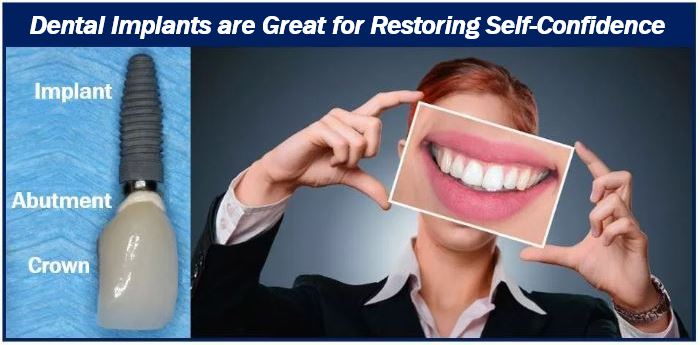
Tooth loss is a widespread problem worldwide. Although dental care has advanced significantly, many people still suffer tooth loss because of, for example, periodontal disease, injury, and tooth decay. For decades, available treatments for people with missing teeth were dentures or bridges, both of which are quite expensive.
Thanks to advances in dental technology, however, today we also have the option of receiving dental implants.
Dental implants interface with the bone of the patient’s jaw. The implant is a titanium post, much like the root of a natural tooth, that a dental surgeon positions into the jawbone. It allows the dentist to mount artificial teeth.
Dental implants are as firm as natural teeth. You can bite into an apple, for example, without having to worry about loosening it.
Do Dental Implants Offer Advantages?
Dental implants offer many advantages. Here are a few of those benefits:
- Better appearance. Since dental implants look like your natural teeth, you’ll both look and feel better. Also, they fuse with your bone, so they work as a permanent fix.
- Easier speech. When you are wearing dentures that might not fit well, your teeth can move, which can affect your speech. For example, when dentures slip, you might sound as if you are mumbling or slurring. Because dental implants work as a permanent fix, it will be much easier for you to talk.
- More comfort. After the dentist has fitted them into your mouth, they stay there, just like your natural teeth do (or did). Dental implants don’t require you to remove them, so there is less embarrassment and no need for adhesives.
- Easier eating. You’ll find that it’s easier to eat with dental implants because they don’t slide, unlike dentures. Your ability to bite into things will be the same as it was before you lost your tooth (teeth).
- Better self-esteem. Nothing boosts our self-confidence like knowing we have a nice smile. Dental implants can give you that self-confidence.
- Better oral health. Unlike in other types of dental treatments, the dentist does not need to alter the size and height of the other teeth next to your implant(s), which results in relatively better oral health.
- Stronger teeth. Dental implants are also sturdy and will remain as permanent fixtures in your mouth for many years. That means you’ll get plenty of long term use out of them.
- No bone loss: if you lose a tooth, bone mass around that area starts to decline because the root is no longer there. Roots encourage strengthening (ossification) of the bone. Dental implants stimulate new bone growth.
- Cost-effective: if we compare the long-term costs of dental implants with other restoration procedures, implants work out cheaper. Other restoration methods typically require regular replacements.
Are Dental Implants A Successful Fix?
Typically, dental implants provide a successful fix when you’re dealing with missing teeth. However, success rates can differ depending on how and where they need to go.
The overall success rate of dental implants is approximately 98%. In the world of medicine and dentistry, that is an extremely good success rate. Also, if you care for them properly, they can last for the rest of your life.
Who Can Get Dental Implants?
There are just a few simple requirements for people who want to receive dental implant surgery. If you are healthy enough to have regular oral surgery, you’re probably eligible for the procedure. You need to make sure that your gums are healthy. You also need to make sure that you have enough bone available to keep the implant secure.
It is vital that you adhere to your dentist’s oral hygiene guidelines. You must commit to routine dental visits to make sure the implants are still securely in place.
If you are a heavy smoker or suffer from diabetes or heart disease, you’ll need to talk to your doctor about whether you should get dental implants.
There needs to be enough bone in your jaw in which to anchor the tinanium implants. You may have to undergo an X-ray or CT scan of your mouth. CT stands for computed tomography. Your dentist will then know whether there is enough bone in your jaw. The scan also provides information about the shape of your jaw and where your sinuses and nerves are.
Most dentists will not recommend dental implants for people under eighteen years of age because their jaws are still growing.
Haemophilia Wales has the following advice for people with hemophilia: (British spelling: haemophilia. USA/Canad: Hemophilia)
“Should you need a tooth extraction, some deeper injections, gum surgery or a dental implant, your dentist should contact your haemophilia consultant or nurse for advice as this type of treatment will usually need to be provided in a specialist center.”
“Your dentist will advise you about how often you need to attend for check-ups and give you information on how to prevent dental problems.”
What’s the Dental Implant Process?
When you discuss the dental implant process with your dentist, you’ll first undergo an individual treatment plan. That plan will assess what your needs are. You will then be advised on what types of implants are best for you.

